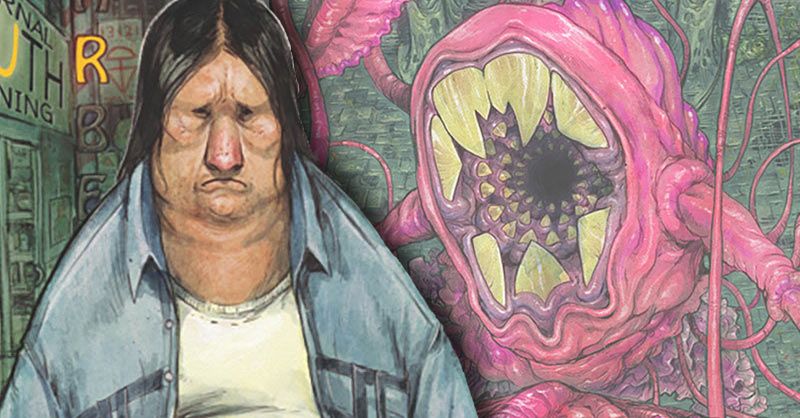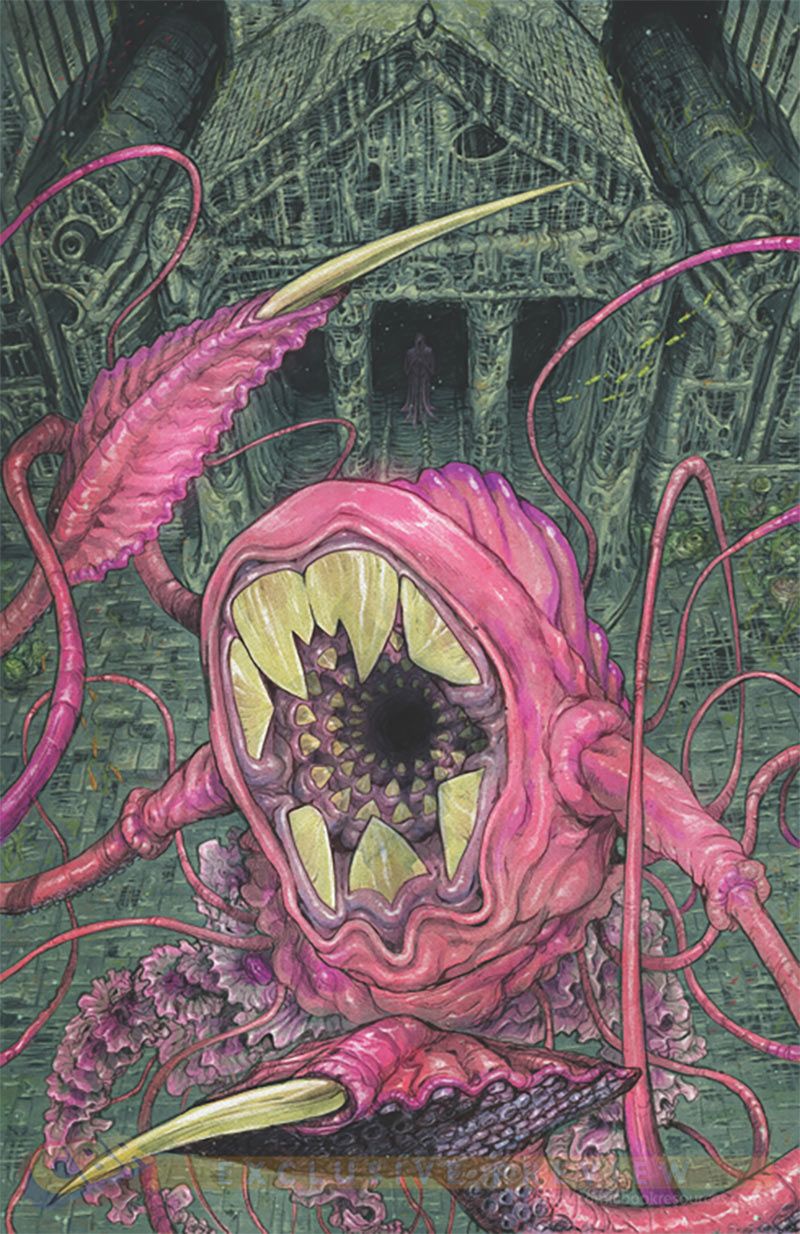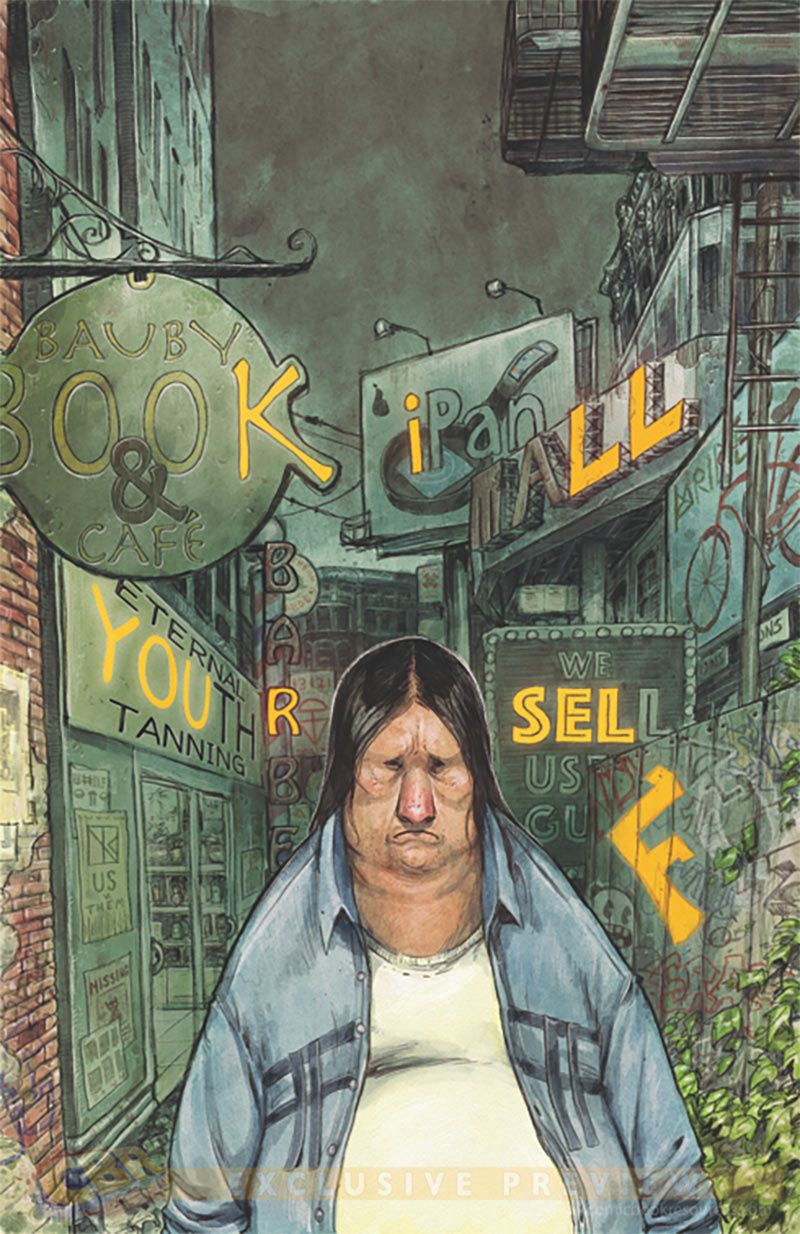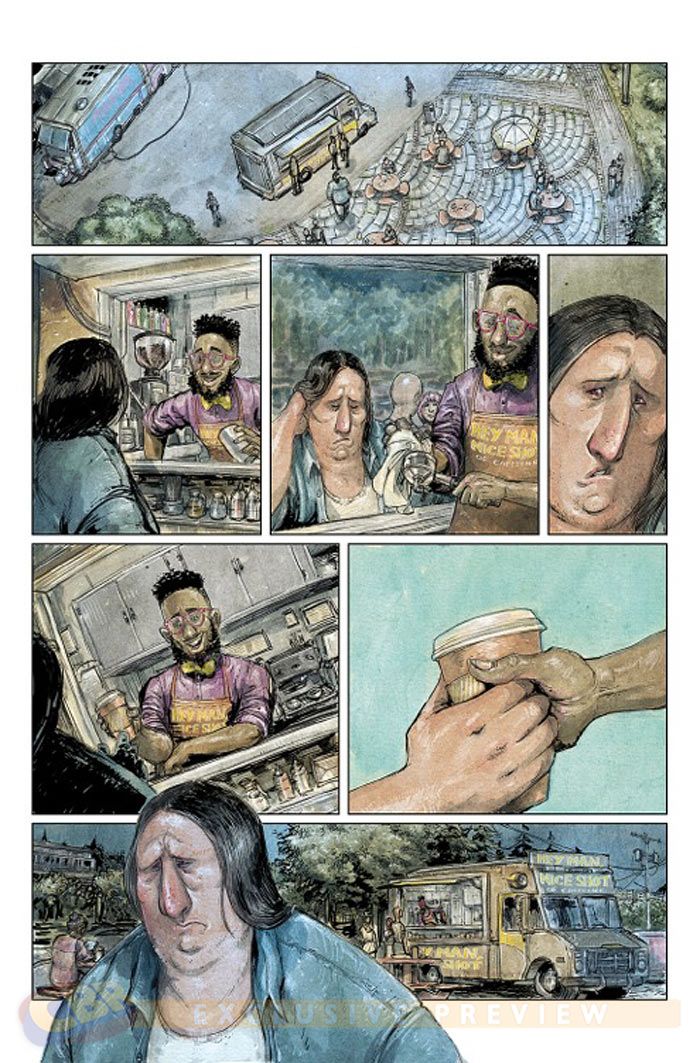Ryan K. Lindsay's new series, "Negative Space," starts from a very dark place. Guy is trying to end his life, but a case of writer's block is getting in the way of his suicide note. Launching in July, with art by Owen Gieni, the Dark Horse Comics title imagines a world where underwater monsters feed off the darkest human emotions, and a corporation has emerged to cultivate these feelings for the beasts. Throughout the series, we follow Guy as he uncovers the truth of the conspiracy that drove him to suicide.
Lindsay got his comics start writing about comics, including a book about Daredevil and a stint as a reviewer on CBR. Now a full-fledged comics creator, Lindsay writes the digital-first ongoing series "Headspace" through Monkeybrain Comics, while Gieni is currently drawing and coloring "Manifest Destiny" at Image.
In addition to sharing an exclusive look at Gieni's art for "Negative Space" #1, Lindsay spoke with CBR News about what readers can expect in his newest series, why he decided to explore the dark feelings most people want to banish or bury, how it all ties into the modern era of big business data-mining us for as much information as possible, and why he believes, "if a company could sell your dreams, it would."
CBR News: It looks like "Negative Space" deals with a lot of heavy concepts -- depression and suicide, conspiracy, corporate evil. What influenced or inspired you to tackle those themes?
Ryan K. Lindsay: These themes are universal: depression, oppression, feeling alone, feeling buried. Everyone feels these to some degree, and some feel them with white-hot intensity. They're so common and yet they're so swept under the rug -- especially with men. Men will not talk about their feelings, so I like shining a spotlight on these issues in stories because they're pertinent. And it also happens that they're fantastic narrative fuel.
If you go through my previous work, you'll see seeds of this. "Fatherhood," a one-shot that I released through Challenger Comics, deals with a father's mental breakdown. "Headspace," on comiXology through Monkeybrain Comics and the IDW trade out on April 29, was about being inside the mind of a very broken man. The thought that we can be so broken on the inside fascinates me in terrible ways.
What is it about comics as a medium that make it particularly suited to exploring this stuff?
I think comics are suited to just about any genre or topic, but for emotionally-charged story fodder like this I think that comics give you particular strategies that are super-effective. Negative space is definitely one: you can place a character in isolation against a white background and have it represent them feeling alone, or you can have a normal establishing shot but white the person out to show how invisible they feel. Not to say you can't do that on film, but it feels a touch more effective on the page. I also like bringing the colorist in -- which in this instance is Owen Gieni coloring his own art, which is just gorgeous -- and having them drop single, flat colors as backgrounds. A quiet face against a red background being rage, all that simple stuff.
I also like to break up time through the use of gutters. Take a single image and slash it with inserted gutters to show how long they've held the pose, or hated themselves in that moment. I recently worked with Eric Zawadzki on a page where a character kills a child. He broke what would be a splash with gutters, and then even inserted inset panels to showcase the changing face of this killer as he did the deed. It was visceral stuff. There are so many ways to use a gutter, small and large.
Or you drop the gutters completely and just do a splash, or even a double page splash. One of my recent favorites of these was a double-page splash of Conan, just sitting down against a wall on his boat, scripted by Brian Wood. It's two pages, nothing fancy, but Declan Shalvey draws it and he brings every emotion to the page, and the emotion is the fact that Conan's love in this tale, Bêlit, has just had a miscarriage. It's so simple, and yet it slams you in the face like a cannon launching out of the tube -- and it helps that Wood makes his pages so dense, so when you get a pause, it really feels like one.
Comics also allow for exaggerated design of characters, facial features, reactions -- you can play with them far more than you ever could on film or in prose. I love the way Owen has brought to life the characters in this book. There's the main antagonist, and as soon as I saw the character sketch, I hated his smug, stupid face; it was glorious.
Because of the focus on emotions, I think the relationships between characters are unusually important to the story. What character types and dynamics can we expect to see?
With Guy as our lead, we have a razor wire to traverse, because he's suicidally depressed, in the actual throes of finally doing it, and yet he's our lead. And he's not a guy who hides it too well, so we are asking our readers to follow this sort of person down into what will obviously be an abysmally dark narrative. But we don't want our readers to only feel bad while reading, so we try to make sure Guy is down, but not passive. He's sad, but he's observant, and interesting. Then, the story also has to ponder change. Is this about Guy finding love, or analyzing himself deeper, or finding purpose? If we do our job right, you'll care about Guy a lot and want to see how he progresses. He is a depressed homosexual First American, and I think that offers up a lot of concepts for people to consider.
In many ways opposite to Guy, we have Rick. He's a high-up operative of Kindred Corp, and I want you to love reading him as much as you hate him (but still secretly like him). Rick is an asshole, put simply, but he's one of those fascinating assholes where you can see how he succeeds. Oozing confidence, looking down upon the world; the way he treats Guy is my way of commenting on many things. Reality TV, social media, people who slow down to look at car crashes. We love to distance ourselves from disaster and tragedy, and pretend we care, while doing nothing about it. Rick is the walking personification of that.
Beyond those two clashing forces, we have this primal, ancient society that is played more as a force than a group of characters, though not completely, which is fun. It's almost like writing the weather as having a motivation, or at least a latent desire that manifests. Then, in the supporting characters, we have Woody, a barista Guy's crushing on but doesn't know how to seal the deal. Also in the first issue, we find out Guy doesn't know nearly enough about Woody. Briggs is Rick's second in command, and she grounds his human garbage personality by being a little more reasonable. You could certainly stand to be in the same room as her.
It's fun to make these characters fit into this conspiracy story, that's wrapped around a love story, that's fueled by an indescribable Cronenbergian force. Very fun.
Even though you're billed as writer, it seems like you think about the images almost as much as the words. What has it been like working with Owen on "Negative Space," and what brought him onto the project?
I like to think, sometimes, that I know how to design a page or make the panels flow together. But I also know when and how to get completely out of the artist's way. The big reason for this is my design/flow is usually based around the idea of it, and the artist brings their game to actually create something that both works and looks good. In the end, I pretty much always defer to them on their version, unless there's something super-specific I'm after. And even then, I need them on board for it.
Owen is a monster at doing all of this. He will add panels to flesh beats out, and drop just the right angles on characters and such. This is my first big thing with Owen -- we previously did a twp-pager which hasn't surfaced yet, stay tuned -- but getting our groove together on this has been easy. He's a total gent to work with, and I'm insanely lucky to have landed him for the story. It all came about because Owen and I have been chatting for years now, looking for something to do, so when I started discussing this story with my editor, Daniel Chabon, I linked to Owen's latest work and it was love at first sight. It all came together very smoothly, and I'm thankful daily for it. Owen's sense of character design is great, his emotional weight on the page is forceful, and he's going to turn serious heads with what he does on this book. Just look at his covers, they are serious pieces of art, from concept, to design, to execution. Owen is the real deal and the full package.
We've got an exclusive preview of Owen's art running alongside this interview, and he is not messing around with the monster. They are seriously scary -- but they're not the only villains in this series. The creatures feed on negative human emotions, but there's also a corporation that produces and sells sadness. How does the dynamic between those two work in the story?
There is a sordid history that we delve into in the story. These monsters have been feeding off human emotion for years, so it's no coincidence that they appear in a story that opens with a guy getting writer's block on his suicide note. The visceral idea of ancient creatures with different biology than us was an interesting thing to think about. How do they imbibe emotions? What's their culture like? I loved playing with bioluminescence -- no surprise there, considering how well Owen colors his own art.
But the kicker to the story came when I slid the Kindred Corporation into the tale. A very human corporation that sets up tragic events and then farms items of sorrow from the people and places, parcels them up, and ships them down to our hidden, emotionally draining monsters. An alliance of manipulation. I figured if people were mad about corporations selling their private information to third party companies, then they'd be pretty upset to know it was now happening with their worst feelings.
That's an interesting take on the era of big data, that emotions are the next frontier. And feelings really do take an important role in this series. It seems like characters that can control emotions or have empathy get a lot of power from that. Does that importance come from any particular experience?
If a company could sell your dreams, it would. We live in a big dollar, quick turnover society. Nothing is safe, we just need science and understanding to catch up and then humans can pillage it, parcel it up, and flip a quick few G's off it.
I wish the ability to know/feel/understand/harness feelings was something real. Look at the people with empathy, and what they could accomplish, if the feeling didn't usually ruin them emotionally and financially - ha! The way emotion drives us to do insane things -- what are we willing to do for love, why can rage cloud our judgment, what does depression cause us to do? I'd almost argue that the weight I give emotion in "Negative Space" isn't that far off the real world; I'm just making it more tactile and explicit.
I think this comes from being someone who is strangely emotional. I'm open and analytical, and yet can sometimes shut down. I'm aware of emotions, and yet can get completely clouded by them at times. I'm also fascinated by what emotions cause us to do: suicide, affairs, sacrifice, bad poetry, being able to stay awake all night when your kid is sick, being able to stay awake all night because your new girlfriend wants to chat and laugh and touch your arm.
I also believe that sometimes we get to choose our emotions. And it's our choice, not our initial emotional reaction, that decides who we are. You can be dealt lemons, and you can get down and whinge; or you can shut down, regroup and trade them for limes down the track; or you can rock on and make some Mike's Hard Lemonade. Your first reaction will build an emotional base, but then you get to springboard into whatever the hell you want. Mostly. Sometimes you can't, so there's the flip, that you can be mired, unable to escape, or constantly thrown back. But will you continue to try to crawl away or will you build a home in the mud?
Emotions are the driving force of our lives, and yet we can't always understand them. We give power over them to others, and they can be unpredictable. In this tale, the worst thing happens: A megacorporation gets some power over emotions, and that's a scary situation to suddenly peep behind the curtain and discover.
I think that idea of having a first impulse and then bringing in logic to temper it can be applied to the process of writing, as well. Do you self-edit in that way? Does your background as a reviewer for CBR -- your experience in evaluating others' work -- affect your writing process?
I'm very big on self-editing -- to a point. In the end, you need a good set of external eyes, but I like to really grill myself before those eyes get the chance. I believe writing is a weird electrical storm of happenstance; the page I write tonight is going to be different than if I attempted that same page tomorrow evening. It's a chaos theory approach, so you never quite know what you're going to get, but you can always bring these things around through prior planning and post-editing. That's the true North, because it's forged through study and practice, not just the insanity of whatever flows after a few coffees.
I think my background as an academic -- I edited and contributed to a book of essays about Daredevil for Sequart -- has helped me understand and learn more about the comic making game, for sure. I also try to analyze my work like I would anyone else's -- what's missing, what's the best, and, always, why? I'm a firm believer that the more you write, the more you'll write, and, slowly, the better it will get. And aside from that, all reading is good reading, so long as you have your process cap on and you're thinking.




